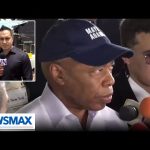The release of a secret audiotape allegedly implicating Lyndon B. Johnson in JFK’s assassination has reignited decades-old suspicions about government transparency and political corruption. Shane Stevens, grandson of LBJ associate Billie Sol Estes, claims the tape captures Estes and LBJ aide Clifton Carter discussing Johnson’s role in hiring hitman Mac Wallace to kill Kennedy. While the tape’s authenticity remains hotly debated, its emergence coincides with the Trump administration’s 2025 release of previously classified JFK files—documents critics say still withhold critical truths.
– The recording purportedly reveals Carter stating LBJ ordered the assassination to secure his presidency and avoid political ruin from looming scandals.
– Stevens says his family kept the tape hidden for decades due to fears of retaliation, citing Estes’ 1962 assassination attempt and mysterious deaths of others tied to LBJ.
– Forensic analysts on Glenn Beck’s program reportedly confirmed the tape’s authenticity, though skeptics like journalist Philip Shenon argue it lacks verifiable chain-of-custody records.
– Newly declassified CIA files show extensive surveillance on Lee Harvey Oswald before 1963 but no direct evidence of a broader conspiracy.
– Historians note Johnson’s known ruthlessness and rocky relationship with JFK, including Kennedy’s alleged plans to drop him from the 1964 ticket.
– Roger Stone and other conservative commentators have long argued that LBJ’s ties to Texas power brokers and the CIA created both motive and means to orchestrate the killing.
For conservatives, the tape symbolizes systemic corruption within the federal government—a “deep state” willing to eliminate leaders who threaten entrenched power structures. The Biden administration’s 2025 release of JFK records, while praised as a step toward transparency, has done little to satisfy those who believe critical evidence remains buried. Glenn Beck framed the tape as a warning: if elites could overthrow a president in 1963, similar forces might still manipulate events today, from election integrity to pandemic policies.
Until the full context of the tape is independently verified, it remains a provocative but unproven artifact. Its real power lies in underscoring lingering distrust in official narratives—a sentiment that continues to shape American political discourse.




